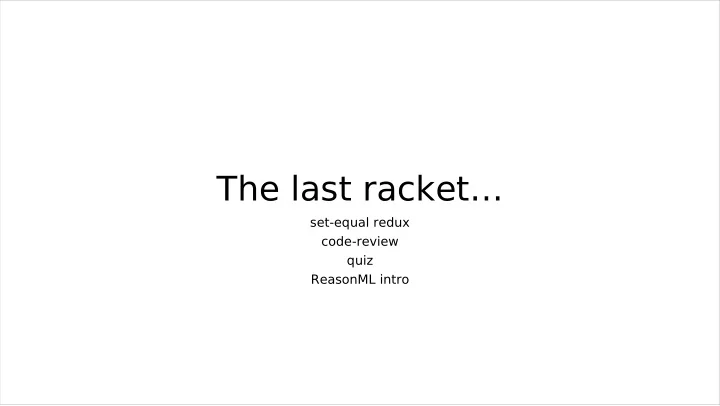

The last racket… set-equal redux code-review quiz ReasonML intro
Announcement • Flu shots today in Sayles Hall • Effectiveness substantially reduced if you didn't get a good night's sleep
Last time: set equality • Represent sets as lists of items, with no repetitions. • Order doesn't matter • Ordinary list-equality isn't a test of set-equality! • (list 1 2) (list 2 1): different lists, same set! • Sets B and C are equal if 1. every member of B is a member of C ("B is a subset of C") 2. every member of C is a member of B ("C is a subset of B") (define (set-equal? b c) (and (subset? b c) (subset? c b)
Subset? • is b a subset of c? • Is each element of b an element of c? (define (subset? b c) (foldr (lambda (item result) (and (member? item c) result)) true b))
What was wrong with that? • suppose s1 is (list (list 1 2) (list 1)) represents a set whose elements are {1,2} and {1} (i.e., its elements are SETS!) • suppose s2 is (list (list 1) (list 2 1)) • Are these "set-equal?" • NO! because the first item in s1 isn't "racket equal" to any element of s2, even though it is equal, as a set, to the second element of s2.
Rewrite member to use an "equality testing" proc ;; s-member? : 'a * ('a list) * ('a * 'a -> bool) -> bool ;; test whether an item is equal to a member of the set ;; s, using the specified equality test (define (s-member? item s eqtest) (cond [(empty? s) false] [(cons? s) (or (eqtest item (first s)) (s-member? item (rest s) eqtest))]))
Rewrite subset! • is b a subset of c? • Is each element of b an element of c? (define (s-subset? b c eqtest) (foldr (lambda (item result) (and (s-member? item c eqtest) result)) true b))
Rewrite set-equal? ! (define (s-set-equal? b c eqtest) (and (s-subset b c eqtest) (s-subset c b eqtest)))
Use this to define particular set-equality tests (define (s-set-equal? b c eqtest) (and (s-subset b c eqtest) (s-subset c b eqtest))) • equality-testing for sets of integers : (define (int-set-equal? b c) (s-set-equal? b c =)) • equality-testing for sets of integer-sets : (define (int-set-set-equal? b c) (s-set-equal? b c int-set-equal)) • Use these last two for your subsets check-expects!
Testing :"subsets" • Using this to test subsets, i.e., compare two sets of int-sets: (check-expect (int-set-set-equal? (subsets (list 1)) (list (list 1) empty)) true)
Code Review 1 (define (flip alop) (cond [(empty? alop) empty] [(cons? alop) (cons (list (second (first alop)) (first (first alop))) (flip (rest alop)))]))
Improved (maybe) (define (flip alop) (cond [(empty? alop) empty] [(cons? alop) (let ((pair (first alop))) (cons (list (second pair) (first pair)) (flip (rest alop))))]))
Code Review 2 (define (my-member? item aloi) (cond [(empty? aloi) false] [(and (cons? aloi) (= item (first aloi))) true] [(and (cons? aloi) (not (= item (first aloi)))) (my-member? item (rest aloi))])) • Problem: code follows both structure and content of data; should be just structure
Improved (1) (define (my-member? item aloi) (cond [(empty? aloi) false] [(cons? aloi) (if (= item (first aloi)) true (my-member? item (rest aloi)))])) Problem: if-expression with a boolean return value – ick!
Improved (2) (define (my-member? item aloi) (cond [(empty? aloi) false] [(cons? aloi) (or (= item (first aloi)) (my-member? item (rest aloi)))]))
Quiz setup: A silly procedure >(define (silly alon) (cond [(empty? alon) (list 1)] [(cons? alon) (append (silly (rest alon)) (silly (rest alon)))])) >(silly empty) (list 1) > (silly (list 3)) (list 1 1) > (silly (list 4 5)) (list 1 1 1 1) >(silly (list 1 3 6)) (list 1 1 1 1 1 1 1 1)
Quiz
Solution
On to ReasonML!
Recommend
More recommend